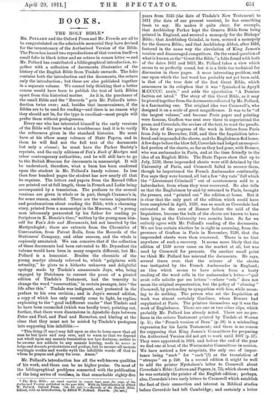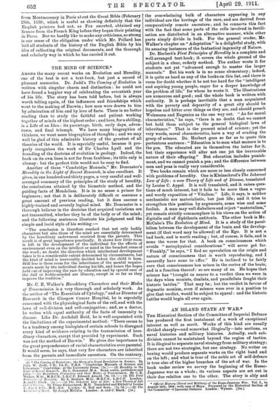BOOKS.
THE HOLY BIBLE.* •
Ma. POLLARD and the Oxford Press and Mr. Frowde are all to be congratulated on the admirable memorial they have devised for the tercentenary of the Authorised Version of the Bible. The Press has issued two reproductions of that version itself—a small folio in black letter and an octavo in roman letter — and Mr. Pollard has contributed a bibliographical introduction, to- gether with a collection of documents illustrative of the history of the English Bible from Tindale onwards. The folio contains both the introduction and the documents, the octavo only the introduction ; but these are also published together in a separate volume. We cannot help thinking that a better course would have been to publish the text of both Bibles apart from this historical matter. As it is, the purchaser of the small Bible and the "Records " gets Mr. Pdlard's intro- duction twice over; and, besides that inconvenience, if the Bibles are to be used for reading—and there is no reason why they should not be, for the type is excellent—most people will prefer them without prolegomena.
Every one who has interested himself in the early versions of the Bible will know what a troublesome task it is to verify the references given in the standard histories. He must have at his elbow many volumes of State Papers, and in them he will find not the full text of the documents but only a resume; he must have the Parker Society's reprints, and the early editions of Fox's Book of Martyrs and other' contemporary authorities; and he will still have to go to the British Museum for documents in manuscript. It will be understood, therefore, what a boon has been conferred upon the student in Mr. Pollard's handy volume. In less than four hundred pages the student has now nearly all that he requires. The letters and papers from the Record Office are printed out at full length, those in French and Latin being accompanied by a translation. The prefaces to the several versions are given in whole or in part, though Cranmer's is, for some reason, omitted. There are the various injunctions and proclamations about reading the Bible, with a charming story, printed from a manuscript in the Museum, of "a young man inhumanly persecuted by his father for reading ye Scripture in K. Heurie's time," written by the young man him- self for Fox's Acts and Monuments, but not inserted by the blartyrologist ; there are extracts from the Chronicles of Convocation, from Patent Rolls, from the Records of the Stationers' Company, and other sources, and the whole is copiously annotated. We can conceive that if the collection of these documents had been entrusted to Mr. Dryasdust the volume would have been in many respects different, but Mr. Pollard is a humanist. Besides the chronicle of the young martyr already referred to, which " palpitates with actuality," he gives us a hitherto unknown and delightful apology made by Tindale's amanuensis Joye, who, being engaged by Dutchmen to correct the press of a pirated edition of Tindale's Testament, had the temerity to change the word "resurrection," in certain passages, into "the life after this." Tindale was indignant, and protested in the preface to his own revision; and in Joye's - second edition, a copy of which has only recently come to light, be replies, explaining to the " good indifferent reader " that Tindale and he have been reconciled (which was hardly true), pointing out, further, that there were dissensions in Apostolic days between Peter and Paul, and Paul and Barnabas, and hinting at the close that they must not be misled by Tindale's prologues into supposing him infallible
:- "This thing (I saye) may fall upon us also to lerne anew that all men be but lyers and may erre, and to warn us that we depend not wholl upon any mannis translation nor hys doctryne, nether to be sworne nor addicts to any mannis lerning, make he never so have and devoute protestacions and prologs, but to mesure all mennis wrytingis wordis and wordis wyth the infallible worde off God to whom be prayse and glory for ever. Amen?'
Mr. Pollard's introduction has all the well-known qualities of his work, and there can be no higher praise. On most of the bibliographical problems connected with the publication, of the long series of versx'auf3, in that remarkable eighty-five
• The Hag Bible : an exact reprint in roman type, page for page, of the Authorised Version published in the year 1611. With an Introduction by Alfred W. Porard. Orford Press. [Ea. ed. net:I—Records of the English Bible. Edited, with an Introduction, by Alfred W. Pollard. Fronde. [Ss. net.] "years from 1525 (the date of Tindale's New Testament) to 1611 (the date of our present version), he has something fresh to say. He makes it quite clear, for example, that Archbishop Parker kept the Geneva Bible from being printed in England, and secured a monopoly for the Bishops' Bible ; that Archbishop Grindal, in turn, secured a monopoly for the Geneva Bible; and that Archbishop Abbot, after 1616, fostered in the same way the circulation of King James's version and discouraged competitors. On the vexed question of what is known as the" Great She Bible,"a folio found with both of the dates 1611 and 1613, Mr. Pollard takes a view which seems to us perfectly sound, but it is a little too technical for discussion in these pages. A more interesting problem, and one upon which the last word has probably not yet been said, is that of the true date of the first Great Bible, which announces in its colophon that it was " fynisshed in Apryll M.CCCCO. xxxix," and adds the ejaculation "A Domino factual est istud." The story of this Great Bible, as it may be pieced together from the documents collected by Mr. Pollard, is a fascinating one. The original idea was Cromwell's, who designed it on a scale of great magnificence. It was to be "of the largest volume," and because Paris paper and printing were famous, Grafton was sent over there to superintend the press, and Coverdale, the reviser of the text, to read the proofs. We hear of the progress of the work in letters from Paris from July to December, 1538, and then the Inquisition inter- fered and impounded the sheets, and the Englishmen fled home. A few days before the blow fell, Coverdale had lodged an unspeci- fied portion of the sheets, so far as they had gone, with Bonner, who was ambassador in Paris, and at the time friendly to the idea of an English Bible. The State Papers show that up to July, 1539, these impounded sheets were still detained by the University of Paris, and Cromwell failed to recover them, though he importuned the French Ambassador continually. Fox says they were burned, all but a few "dry vats" full which the "Lieutenant Criminall " out of covetousness sold to a haberdasher, from whom they were recovered. He also tells us that the Englishmen by-and-by returned to Paris, brought the presses, and "printed out" the edition at home. But it is clear that the only part of the edition which could have been completed in April, 1539, was so much as Coverdale had entrusted to the care of Bonner before the raid of the Inquisitors, because the bulk of the sheets are known to have been lying at the University two months later. So far we entirely agree with Mr. Pollard's reading of the documents. We are less certain whether he is right in assuming, from the presence of Grafton in Paris in November, 1539, that the impounded sheets were then recovered. There is no hint anywhere of such a recovery. It seems more likely that the edition of 1539 never came on the market at all, but was used by Cromwell for presents. On another small point we think Mr. Pollard has misread the documents. He says, several times over, that the seizure of the sheets was instigated by the French Ambassador in England; an idea which seems to have arisen from a hasty reading of the word cella in the ambassador's letter—" quil avoit cella solicits par ses lettres "—where "cela " does not mean the original sequestration, but the policy of " abusing " Cromwell, by pretending to sympathise with him, while mean- ing to do nothing. The person who set the Inquisition at work was almost certainly Gardiner, whom Bonner had supplanted at Paris. The printers themselves say it was the work of Englishmen. There are one or two other slips, which probably Mr. Pollard has already noted. here are no pre- faces in the octavo Testament printed by Tindale at Worms (p. 5) ; the "French version of Beza " (p. 28) is a misleading expression for his Latin Testament; and there is no reason for supposing that King James's Committees for preparing the Authorised Version did not get to work until 1607 (p. 57). They were appointed in 1604, and before the end of the year we find one at least of the Westminster Committees in session. We have noticed a few misprints, the only one of impor- tance being "such " for " each "(?) as the translation of " utraque " on p. 249. In a second edition it might be well to add the printer Nyoholson's letter to Cromwell about Coverdale's Bible (Letters and Papers, ix. 75), which shows that he was certainly the printer of the English edition ; perhaps, also, Coverdale's two early letters to Cromwell which establish the fact of their connection and interest in Biblical studies before Coverdale had left Cambridge; and certainly a letter
from Montmorency in Paris about the Great Bible (February 25th, 1539), which is useful as showing definitely that the English printers bad not, as Fox asserted, obtained any licence from the French King before they began their printing in Paris. But we hardly like to make any criticism; so strong is our sense of the obligation under which Mr. Pollard bas laid all students of the history of the English Bible by his idea of collecting the original documents, and the thorough and scholarly way in which he has carried it out.



























































 Previous page
Previous page